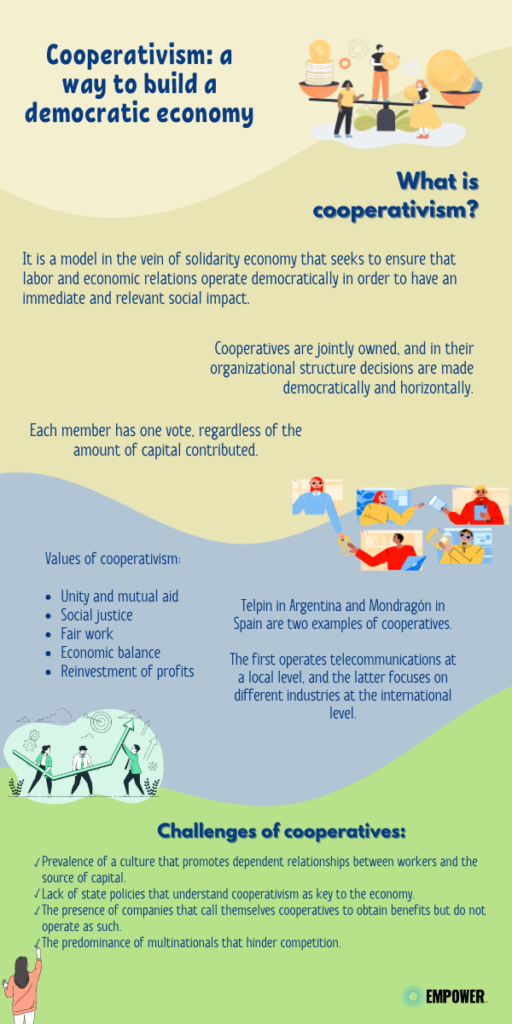
Long-term cooperativism, Telpin and Mondragon
31 de January de 2023
Translated from Spanish
Escaping capitalist logic, reinvesting profits and generating fairer and more democratic working relationships are some of the historical objectives pursued by cooperativism, an economic model that is kept alive thanks to local, national and international projects that envision it as an alternative way of doing business. Companies such as Telpin in Argentina and Mondragon in Spain are two examples that have worked thanks to the spirit of working in community and the existence of regulations that, although not perfect, have allowed their development. Far from idealism, cooperativism also faces difficulties, such as surviving economic crises, existing within regulatory frameworks that do not promote their financial benefits, and the presence of fake cooperatives, according to experts interviewed by Empower.
This article is part of Empower’s new Democratic Economies area of work, in which we seek to give visibility to and encourage conversation about economic actors and phenomena that revolve around economic and financial values that are more democratic, fair and solidary for societies.
By Claudia Ocaranza
Cooperativism is part of the solidarity economy movement, a model that seeks to democratically operate labor and economic relations in order to have an immediate and relevant social impact. According to Claudia Caballero, who has degrees in economics and sociology, from the National Polytechnic Institute (IPN in Spanish) and National Autonomous University of Mexico (UNAM in Spanish), respectively, as well as 15 years of experience in alternative economic models, “there is increasing awareness that the capitalist or techno-financial economic model is leading us to the destruction of what we call ‘human.’ Capitalism has neither head nor tail. These (solidarity) models seek a more just society.”
Just as there are different models within the solidarity economy, there are also different models of cooperativism. These include consumer cooperatives, credit cooperatives, service cooperatives, integral cooperatives and others that are not institutionalized as such but operate with the idea of maintaining democratic structures of production and work.
Cooperatives are jointly owned and have a democratic, horizontal decision-making and organizational structure. “All members have equal voting rights, regardless of the capital they contribute to the enterprise,” according to the International Cooperative Alliance.1“Qué es una cooperativa,” Alianza Cooperativa Internacional, www.ica.coop/es/cooperativas/que-es-una-cooperativa.
Argentina, much like certain regions of Spain, has a long history of cooperativism. Agustina Silombra, part of the the Argentine Federation of Technology, Innovation and Knowledge Worker Cooperatives (FACTTIC in Spanish),2FACTTIC, accessed 22 January 2023, https://facttic.org.ar/facttic. explained to Empower that being part of a cooperative “is a political decision; it is not always convenient for us to join or establish a cooperative. Often it is not convenient because democracy is not perfect but at least we are trying to escape from a capitalist logic. Although we are immersed in it, and it is impossible not to be, what we propose is an alternative to this type of relations, one based on us not wanting to keep the profits of anything. It is about being able to live.
Telephone lines for all
According to Martín Pagano, manager of the Telpin cooperative located in Pinamar, on the Argentinean coast, which operates in the telecommunications sector, cooperativism “is a business model where social responsibility is fundamental, where not falling into corruption is fundamental and where the money does not leave the country, it continues to be reinvested. It has the values we had as young people when we fought for ideals,” he said in an interview with Empower.
This project began in 1962, in a poorly connected Argentina, where state-owned companies were the ones providing telecommunications services and it could take up to two years for a phone line to reach the areas farthest from the main urban centers. For this reason, Enrique Susini and four other people organized to install phone lines in homes. By 1 January 1963, they had already installed 92.3“La empresa,” Telpin, https://telpin.com.ar/acerca-de-telpin.
Sixty years have passed, and the cooperative’s operations have expanded as it continues to defend its business model, one that consists of making its customers and employees members, with a decision-making process that includes everyone and a board of directors made up of “people with a long history in their industries” that rotates every three years.

In 1973, Argentina’s Law of Cooperatives established the guidelines under which these business models must operate.4“Ley de Cooperativas,” Poder Ejecutivo Nacional, 2 May 1973, www.argentina.gob.ar/normativa/nacional/ley-20337-18462/actualizacion. Telpin adapted to the regulations, which, according to Pagano, sometimes confuse the concept of cooperativism and cooperative objectives, allowing for the presence of companies that call themselves cooperatives but are not. For example, in September 2022, the authorities discovered an establishment that passed itself off as a pine resin cooperative but, in reality, exploited 29 workers who did not receive returns from production or have a vote in the company’s assemblies.5“Corrientes: el Comité participó de un allanamiento que detectó fraude laboral en una empresa forestal del Iberá,” Gobierno de Argentina, 1 September 2022, www.argentina.gob.ar/noticias/corrientes-el-comite-participo-de-un-allanamiento-que-detecto-fraude-laboral-en-una-empresa.
The telephone company currently operates 31,000 Internet accounts, 10,000 television accounts and 40,000 telephone accounts, in addition to employing 140 people who are also partners in the business. As a result of this dual status, they receive benefits in addition to their salary. Telpin’s customers are also partners in the business and can participate in the nomination of candidates for the board of directors.
From the Basque Country to the world
The Mondragon Corporation is a case of cooperativism that has managed to cross borders. The cooperative was created in 1956 by José María Arizmendiarrieta, in the Basque Country, during the control of the Second Republic, which ruled all of Spain. Currently, Mondragon brings together 240 entities, of which 83 are cooperatives, in which 68,743 people work in four branches: industrial, distribution, financial and knowledge.
Like Telpin, Mondragon’s principles are marked by the generation of work that is “more equitable, fairer and solidary, in search of societies with a high level of well-being. Wealthy societies, more cohesive and equitable, not rich people,” Javier Marcos, Mondragon’s communications director, told Empower.
This company has reached other regions of Spain and the world. According to figures published by the cooperative, 44.1% of its workers are in the Basque Country, 40.9% in the rest of Spain and 15% in the international market.6“Dossier de prensa,” Corporación Mondragón, www.mondragon-corporation.com/wp-content/uploads/docs/MONDRAGON-dossier-prensa-ES.pdf. In Mexico, it has 18 subsidiaries employing 2,775 people in San Luis Potosí, Guanajuato, Coahuila, Querétaro and Mexico City, the company shared with Empower.
“Cooperatives have to compete with a business model that is deeply rooted in our society, the capitalist model, and they have to do so with a totally different paradigm: people’s protagonism (workers take part in ownership, management and profits), organizational democracy (one person, one vote) and commitment to the environment (through the generation of employment),” added Marcos. This is why, after a trial period that generally lasts between six months and one year, employees have the possibility of becoming shareholders.

Taking into account the principle of equitable education as one of the backbones of cooperativism, Mondragón also has a university where people can be trained in the areas in which the company operates, as well as in the functioning of the cooperative.
The issue of education is, in fact, one of the places that cooperativism lags behind in a capitalist world, because “we are trained to be dependent workers and many times we jump into the pool of cooperativism without fully understanding the roles and tasks that we should know when we form a social enterprise. We are not trained to be self-employed workers,” explained Silombra, of FACTTIC in Argentina.
An open model
One of the principles of cooperativism is inter-cooperation, not only among cooperatives but also with other types of companies and institutions, because “we must join forces to face the ambitious business and social challenges of these times,” said Marcos.
Mondragon’s social-business policy for the 2021-24 period reflects the need to “collaborate with foreign actors to achieve a relevant position in the markets, diluting risks and maximizing opportunities.”
Telpin also believes in inter-cooperation with companies that are not cooperatives, as long as there are laws that require multinationals to compete on equal footing. In 1999, Telpin partnered on a joint venture with Telecom Argentina (NYSE:TEO) in order to have more coverage. After 20 years, in 2020, the two parted ways amicably, according to Pagano. Telpin continued operating in the town of General Madariaga, near Pinamar.7“Telpin se queda con Madariaga,” El Mensajero, 14 January 2020, http://diario-elmensajero.com.ar/index.php?notaid=5e1df078c374f.
Inter-cooperation among cooperatives is also a form of survival. In both Argentina and Spain, there are federations of cooperatives, or cooperatives of cooperatives, which allow companies to lower their prices and make alliances in order to compete with traditional companies.
“A cooperative buys fiber for 100 American dollars, while a multinational buys it for 20. We have long seen this as a great challenge; we came together as a cooperative organized under federations and chambers in order to carry out projects together among several small suppliers. Today technology allows it, but it was not possible before,” said Pagano.
In crisis, people come out to support each other
Unity and mutual aid are perhaps the most important principles for cooperatives in the face of individualistic systems, such as the capitalist system, especially in times of crisis.
Such was the case with the Covid-19 pandemic, which revealed more clearly the injustices of the capitalist labor system, in which many companies laid people off and illegally cut wages as the rich got richer. It also highlighted the need for alternative business models that put people first, not profits for the benefit of a few.
“During the pandemic, there were many governmental actions aimed at small and medium-sized enterprises that were not reached by cooperativism. Some of them were, but others were not, and cooperatives ended up being saved by their cooperative bonds. I do not know if it is easier to be a cooperative than a capitalist enterprise in a crisis situation, but what is certain is that the cooperative form has a base of solidarity, so you will never be alone. When there are crises, people come out to support each other,” said Silombra, member of the El Maizal cooperative.
Although Pinamar was not an epicenter of the health emergency, Telpin gave free Internet access to students and teachers who did not have it, so they could take classes online. The company also enabled free Wi-Fi networks throughout the city so that people could connect from the park.

Cooperativism as the future
Taking a step back from the idealism of social economy models, such as cooperativism, it is also necessary to measure their impact so that there are cooperatives that persist over the years. State policies are also needed to promote them as key projects for the economy, not just as populist programs, according to Silombra.
“There must be a positive trend; if not, it is not working. The consequences of the proposed economic results are important. Then it is necessary to measure how much the needs of the people who are part of the companies are being met and satisfied. This requires a cooperative social balance sheet, like a financial statement, but with the social goals that the projects are setting,” Miguel Torres Cruzaley, a specialist in Solidarity Economy from the Andalusian School of Solidarity Economy, told Empower.
In the face of the capitalist tendency that has led countries to climatic, economic and social crises, cooperativism is an alternative that is gaining more and more followers. According to Pagano, manager of Telpin, multinational capitalist companies “could coexist with cooperatives if they also sought a healthier environment, as cooperatives do. Everything that has to do with corporate social responsibility and principles of equity and justice that cooperatives promote is healthy both for a multinational and for the country.”
Marcos, from Mondragon Corporation, affirms that that “we think our model is the future, because it is in tune with current concepts such as sustainability, cooperation and humanism in the company.”
The experts interviewed for this article agree that cooperativism, as well as the solidarity economy movement, are an alternative that can create structural changes leading to a fair and democratic economy. The validity of these forms of organization is more evident now than ever, in the face of the failure of dominant economic models that favor big capital.
1 “Qué es una cooperativa,” Alianza Cooperativa Internacional, www.ica.coop/es/cooperativas/que-es-una-cooperativa.
2 FACTTIC, accessed 22 January 2023, https://facttic.org.ar/facttic.
3 “La empresa,” Telpin, https://telpin.com.ar/acerca-de-telpin.
4 “Ley de Cooperativas,” Poder Ejecutivo Nacional, 2 May 1973, www.argentina.gob.ar/normativa/nacional/ley-20337-18462/actualizacion.
5 “Corrientes: el Comité participó de un allanamiento que detectó fraude laboral en una empresa forestal del Iberá,” Gobierno de Argentina, 1 September 2022, www.argentina.gob.ar/noticias/corrientes-el-comite-participo-de-un-allanamiento-que-detecto-fraude-laboral-en-una-empresa.
6 “Dossier de prensa,” Corporación Mondragón, www.mondragon-corporation.com/wp-content/uploads/docs/MONDRAGON-dossier-prensa-ES.pdf.
7 “Telpin se queda con Madariaga,” El Mensajero, 14 January 2020, http://diario-elmensajero.com.ar/index.php?notaid=5e1df078c374f.




